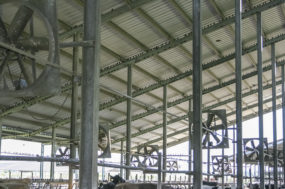In March, Congress passed and President Trump signed the $1.3 trillion omnibus spending bill, formally called the Consolidated Appropriations Act, 2018. What you might not have realized is that there are a number of provisions included within that bill that will significantly impact the dairy industry.
CERCLA air emissions reporting
For months, animal agriculture – and dairy in particular – has been concerned about the impending requirement that agricultural operations report air emissions of hydrogen sulfide and ammonia from animal waste. The Comprehensive Environmental Response, Compensation and Liability Act, known as CERCLA or Superfund, was intended to require reports of emissions of hazardous substances over a certain threshold. Although the EPA promulgated an exemption from reporting for agricultural operations in 2008, a federal court decision in 2017 invalidated that exemption. Thus, the clock was ticking and it was expected that producers would be required to report emissions of hydrogen sulfide and ammonia from manure as of May 1, 2018.
However, in Title XI of the spending bill, Congress passed the Fair Agricultural Reporting Method ("FARM") Act. This provision states that the reporting requirements of CERCLA do not apply to the application, handling or storage of a FIFRA registered pesticide by an agricultural producer or to air emissions from animal waste at a farm. A "farm" is defined as a site or area (including structures) used for the production of a crop or the raising or selling of animals, and produces at least $1,000 in agricultural products per year. This is an important development for agriculture and should alleviate concern among dairy farmers over how to properly manage and report air emissions.
ELD enforcement delay for livestock and insect haulers
Earlier this year, the Federal Motor Carrier Safety Administration (FMCSA) passed regulations requiring electronic logging devices (ELDs) be placed on commercial motor vehicles in the U.S. unless certain exemptions were met. This was met this a good deal of concern from the livestock industry, who pointed to safety concerns for livestock if haulers were forced to stop traveling so as not to violate their allowable hours, thereby stranding animals in trucks or trailers for hours.
The spending bill includes language in Division L, Section 132 prohibiting funding being used by DOT for enforcing the FMCSA regulations related to hours of service and ELDs for livestock and insect haulers through Sept. 30, 2018. "Livestock" in this context is defined as "cattle, elk, reindeer, bison, horses, deer, sheep, goats, swine, poultry (including egg-producing poultry), fish used for food and other animals designated by the Secretary that are part of a foundation herd or offspring or are purchased as part of a normal operation." Between now and Sept. 30, 2018, the agency is set to further review the new regulations and offer additional guidance on how this applies to the livestock industry.
Meanwhile, separate from the spending bill, a second 90-day waiver is in place not just for livestock, but for all agricultural haulers, through June 18, 2018.
Although many agricultural haulers driving pickups and trailers will likely fall under an exemption and not be required to install an ELD on their vehicle even after the waiver and funding prohibition expire, this is an important issue and all people transporting livestock should take the time to understand the rules and analyze whether they may be required to comply with the ELD requirement.
Dairy labeling requirements
There had been talk in Congress about how to deal with the issue of non-animal based products being referred to as milk. The Dairy Pride Act was introduced last year in the Senate and would have prohibited foods from using names like “milk” or “cheese” unless the primary ingredient was or was derived from “the lacteal secretion, practically free from colostrum, obtained by the complete milking of one or more hooved animals.” That bill did not pass, but building upon this, in the House Report related to the spending bill is an instruction for the Food and Drug Administration to develop a standard of identity for dairy products and to issue guidance to the industry on how to implement this standard.
‘Grain glitch’ fix
When Congress passed the Tax Cuts and Jobs Act bill back in December, there were provisions giving additional advantages in the form of deductions to producers who sold grain to cooperatives that did not exist for farmers selling to independent buyers. When this was discovered, numerous congressmen said this was an inadvertent error that would be remedied. The spending bill corrected this “grain glitch” in Division T, Section 101, which essentially does away with the deduction advantage given to co-ops under the Tax Cuts and Jobs Act. Although it was dubbed the “grain glitch,” this will also affect dairy producers, given a large percentage of the nation’s milk – more than 80 percent – is marketed by cooperatives. ![]()

-
Tiffany Dowell Lashmet
- Assistant Professor & Extension Specialist
- Texas A&M AgriLife Extension Service
- Email Tiffany Dowell Lashmet




